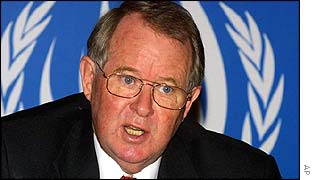John Dugard has been awarded the Peter and Patricia Gruber prize for Justice for 2010
Professor John Dugard, the South African international lawyer who was United Nations special rapporteur for human rights in Palestine for seven years, has been awarded the Peter and Patricia Gruber prize for Justice for 2010. At a ceremony at George Washington University, Washington on October 11 Dugard’s record during the apartheid era was lauded. His human rights involvement with Israel and the occupied territories also featured in the tribute.
Dugard shared the US$500,000 prize with an Australian judge and an American Indian law resource centre.
Arthur Chaskalson, the first president of the South African Constitutional court, himself a previous prize winner, was a member of this year’s ‘Justice’ selection panel.
Those who nominated Dugard for the prize included Dame Rosalyn Higgins, former president of the International Court of Justice; Archbishop Desmond Tutu (he described the lawyer who represented him in the apartheid era as ‘a fair, level-headed, quietly passionate man’); and the American judge, Theodor Meron.
Meron, when legal counsel to the Israeli foreign ministry after the Six-Day War, wrote a secret memo for prime minister Levi Eshkol, who was considering creating an Israeli settlement on the West Bank at Kfar Etzion. Meron concluded that creating new settlements in the Occupied Territories would be a violation of the Fourth Geneva Convention. After 1977, Meron taught at New York University School of Law and is presently a judge on the Appeals Chamber of the International Criminal Tribunals for the Former Yugoslavia and Rwanda.
John Dugard had visited Israel and Palestine on several occasions from 1982. After leaving South Africa in 1998 to become professor of international law at Leiden, Holland, his influential role in Israel-Palestine began. In 2001, after the start of the second Intifada he chaired the UN Human Rights Inquiry Commission that investigated violations of human rights and humanitarian law in the Occupied Palestinian Territory.
Thereafter, he became Special Rapporteur to the commission (later Human Rights Council) in the Palestinian Territory. He visited the West Bank, Gaza and East Jerusalem twice a year. His reports examined issues such as settlements, restrictions on freedom of movement, treatment of prisoners, demolition of houses and military incursions, as well as healthcare, education, and social and economic conditions. Comparing the plight of the Palestinians with that of the blacks in South Africa struck a raw nerve with most Israelis.
In his 2003 report he drew attention to the wall Israel was constructing in the Palestinian territory that would result in the de facto annexation of the zone between the Green Line and the wall. He examined the consequences of its construction for Palestinians living in this zone and in the vicinity of the wall. Dugard’s report on the wall to the International Court of Justice at The Hague influenced the Advisory Opinion that found that the wall did violate international law.
In 2009 he chaired a League of Arab States ‘Independent Fact Finding Committee’ investigating violations of human rights and international humanitarian law during Operation Cast Lead, Israel’s war in Gaza in 2008-09. After visiting Gaza, the committee reported that Israel had committed serious violations of international humanitarian law, constituting war crimes and crimes against humanity. It also found that Palestinian militants had committed war crimes by firing rockets indiscriminately into Gaza. The committee recommended that its report be referred to the prosecutor of the International Criminal Court for investigation.
The Israeli authorities were not willing to discuss with him human rights abuses in the Palestinian Territories. His compatriot, Judge Richard Goldstone, whose United Nations report on Cast Lead was vilified by the Jewish community in South Africa, was to have a similar experience.
Dugard, a Christian of French Huguenot descent, has received rough treatment for his views on pro-Israeli websites and the Jewish community in his native country. Recently, he endorsed an academic petition calling for the termination of an agreement between the University of Johannesburg and Ben-Gurion University, because of the Israeli university’s support for combatants in the occupation.
In 2007, Dugard told the BBC that the United Nations was doing itself ‘little good’ by remaining in the Quartet – the US, Europe, Russia and the UN – which oversees the peace process. The Quartet, he said, was hampering the Palestinians’ right to self-determination.
Peter Gruber escaped from Hungary with his Jewish parents in 1939 and grew up in India, where he was influenced by Buddhism. After studying science, religion and philosophy in Australia, he set up a successful asset management business on Wall Street. The ‘Justice’ prize is one of several that recognises ‘worthy and notable human achievement’.
In the ten years since the Justice prize was launched, the only previous winner with Israeli connections was Aharon Barak, long-time president of Israel’s supreme court.
ends

